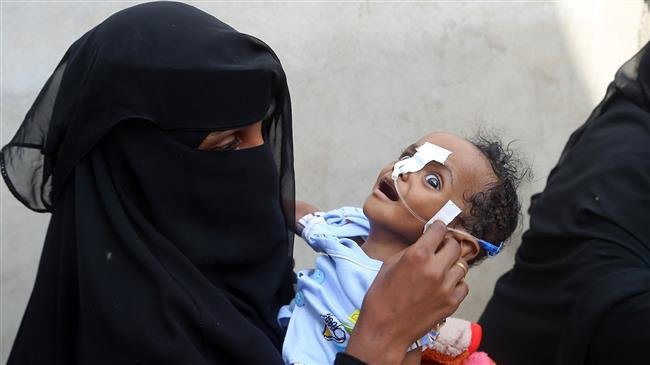
RNA - Medicine prices have soared as well, with some people unable to buy any at all and others forced to buy and take less than they need, Al-Jazeera reported.
It comes after Yemen's health minister warned that more than eight thousand hemodialysis patients will lose their lives if the Saudi-imposed blockade on the country persists and medical supplies run out.
Patients with chronic kidney diseases have to undergo three sessions of treatment weekly, but the crippling siege has resulted in the scarcity of dialysis solutions, Dr. Taha al-Mutawakel told Al-Masirah television network in mid-October.
“Over the past four months, patients with renal failure were in need of a million sessions of dialysis; but we could not cover more than ten thousand sessions as we were in dire need of relevant solutions,” he pointed out.
Mutawakel further noted that Yemeni medical officials are doing their best to prevent the collapse of the health system in the crisis-hit Arab country.
Saudi Arabia has been striking Yemen since March 2015 to restore power to fugitive president Mansour Hadi, a close ally of Riyadh. The Saudi-led aggression has so far killed at least 17,500 Yemenis, including hundreds of women and children.
Despite Riyadh's claims that it is bombing the positions of the Ansarullah fighters, Saudi bombers are flattening residential areas and civilian infrastructures.
Reports by independent world bodies have warned that the Saudi-led air campaign against Yemen has driven the impoverished country towards humanitarian disaster, as Saudi Arabia's deadly campaign prevented the patients from travelling abroad for treatment and blocked the entry of medicine into the war-torn country.
According to Fars News Agancy, Yemen is the world’s largest humanitarian crisis with more than 22 million people in need and is seeing a spike in needs, fuelled by ongoing conflict, a collapsing economy and diminished social services and livelihoods.
The blockade on Yemen has smothered humanitarian deliveries of food and medicine to the import-dependent state.
The UN has recently called the humanitarian situation in Yemen "bleak" and stressed that they are losing the battle against famine in the country.
The United Nations humanitarian chief warned that Yemen is on the verge of widespread famine, with about half of the population completely relying on humanitarian aid for survival.
Addressing the Security Council on Tuesday, UN Undersecretary-General for Humanitarian Affairs Mark Lowcock said "there is a clear and present danger of an imminent and great big famine engulfing Yemen".
Lowcock told the UN's most powerful body that this famine would be "much bigger than anything any professional in this field has seen during their working lives".
He added that "the situation is now much graver" than when the world governing body last warned of a risk of famine at the beginning of 2017 and again last November, because "of the sheer number of people at risk".
According to Lowcock, last month's estimate that 11 million people could soon face "pre-famine conditions" actually stood closer to 14 million - about half of Yemen's population.
Lowcock said last month that the worsening food crisis was in large part the result of an intensification of fighting around the key port city of Hudaydah.
"Fierce clashes continue in Hudaydah, including intense fighting, shelling and air raids in Hudaydah City over the last several days," Lowcock added.
"Yemen is almost entirely reliant on imports for food, fuel and medicines," Lowcock stated, noting that "and the available foreign exchange - from what little remains of oil exports, from money sent home by Yemenis out of the country, and from international assistance - has been simply inadequate to finance adequate levels of imports to support the population."
Fighting near Hudaydah has escalated since June 13 after the Saudi-UAE alliance launched a wide-ranging operation to seize the strategic seaport.
At the beginning of 2017, the United Nations and its partners were able to provide aid to three million hungry Yemenis. Since then, assistance has been scaled up, reaching eight million people in September because of generous funding from donors, Lowcock said, but far below the 14 million people who may need it.
Lowcock added that three conditions are required for famine to be declared: At least one in five households faces an extreme lack of food, more than 30 percent of children under the age of five are suffering from acute malnutrition, and at least two out of every 10,000 people are dying every day.
An assessment is now under way across Yemen to measure the risk of famine and initial results are expected in mid-November, he stated.
A UN panel has compiled a detailed report of civilian casualties caused by the Saudi military and its allies during their war against Yemen, saying the Riyadh-led coalition has used precision-guided munitions in its raids on civilian targets.
847/940